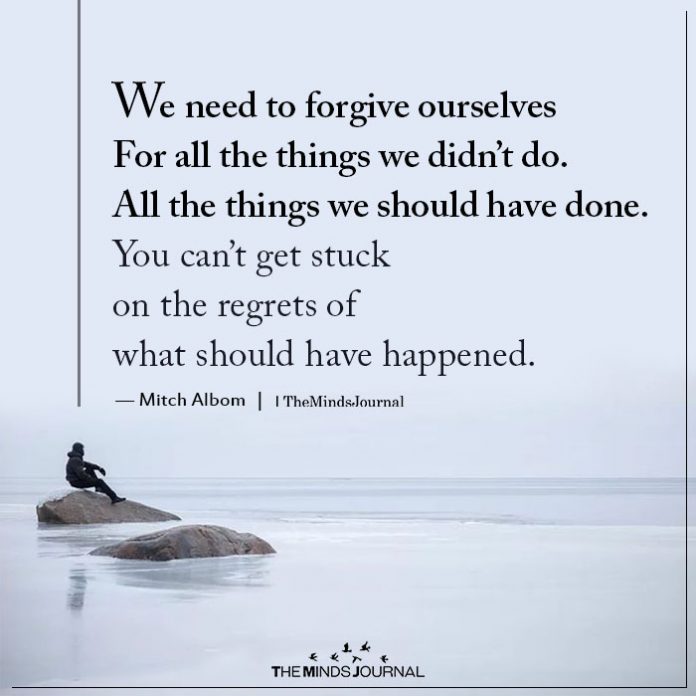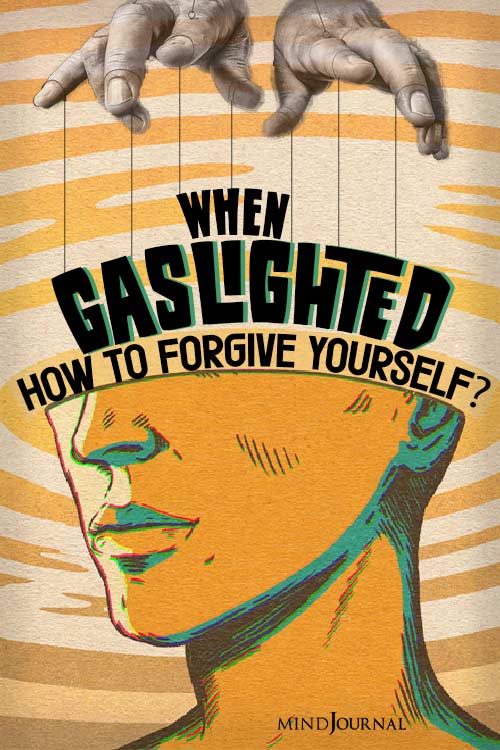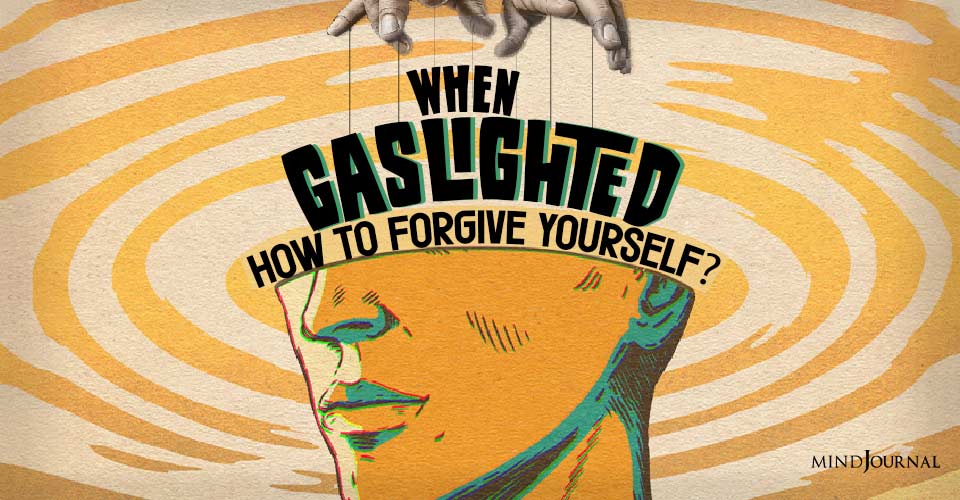Being on the other side of gaslighting is a painful place to be, and it’s very easy to doubt and judge yourself for not realizing the truth sooner. The question that remains is whether or not you need to practice self-forgiveness for being gaslighted.
Key Points
Gaslighting can cause considerable confusion: Have I acted wrongly? Should I repent?
A person needs to look clearly at the gaslighter's accusations, and, if they are an illusion, resisting self forgiveness is important.
Falling for the lies of gaslighting may best be handled by self-acceptance rather than by self forgiveness.
I recently was asked this question: “I have been a victim of gaslighting for over a year with constant accusations leveled against me by a now-former partner. Getting out of that toxic relationship took courage, but I did it. Now, as I pick up the pieces of my life, I wonder if I should forgive myself.
In other words, what if I really did act inappropriately, at least to a degree, as he has accused me? I should have recognized the gaslighting much sooner. Would self forgiveness ease my inner pain?”
Related: Why It’s So Hard To Trust Again After A Toxic Relationship
Defining Gaslighting
The theme of gaslighting has become popular in psychological literature. It now is well known that the word “gaslighting” comes from a 1938 play, Gas Light, in which a female character is continuously falsely accused of wrongdoing, causing her to doubt her own sanity.
Gaslighting is present when there are false denials by the other or false accusations toward you by the other. Two kinds of accusations against you include (1) insisting that you have committed an act or a series of acts you did not commit (e.g., “You skimmed funds from our checking account.”) and (2) accusing you of a serious character flaw (e.g., “You are so continuously angry that I can’t stand it anymore. I am out of here.”).
Both kinds of accusations, when they are untrue, are potentially serious injustices against you. Therefore, you have the right to stand up for what is fair and even to consider forgiving the person, if you choose to do so, for these distortions of who you are as a person.
Is self forgiveness appropriate in this context of being gaslighted by a partner?

Defining Self Forgiveness
To self forgive is to welcome yourself back into the human community when you have broken your own moral standards. When you self forgive, you work to reduce resentment toward yourself and to offer self-respect, generosity, and a reawakened love toward yourself.
If you have offended others from the broken standard, it is appropriate to seek forgiveness from those whom you offended. This seeking of forgiveness is not part of self-forgiving, but it is associated with it.
Self forgiveness can be controversial. Some say that we cannot be our own judge and jury at the same time, and, so, self forgiveness is not reasonable. Yet, as I point out in my book, 8 Keys to Forgiveness when you self forgive, you are practicing the virtue of mercy toward yourself.
And this next point is very important: You continually extend virtues toward yourself, such as being fair to yourself (the virtue of justice), taking care of yourself (the virtues of kindness and wisdom), and being patient with yourself when you are learning new things in life.
If you can practice all of these virtues toward yourself, why would anyone want to bar you from one of the important moral virtues: loving yourself in the face of disappointment, disapproval, and in extreme cases, self-hatred after you have broken one of your moral standards?
Related: 15 Ways To Be Kind To Yourself (Especially When Feeling Down)
When Is It Appropriate To Self Forgive?
Having defined gaslighting and self forgiveness and having defended that self forgiveness is appropriate when you have broken your own standards, let us answer the question above. Should the letter-writer forgive herself because the other accused her of wrong-doing? The answer is an emphatic no. This is the case precisely because, in her carefully considered view, she did not break her own moral standards.
To self forgive under this circumstance is to give in to the gaslighting illusion. It is to enable someone who needs correction. Self forgiveness may be another level of cooperating in the other person’s illusion. After all, to claim that you have broken a moral standard is to agree with the accusations leveled against you.
Yet, what if the letter-writer truly believes that she should have caught the gaslighting pattern much sooner and therefore allowed herself to be abused for too long? Under this circumstance, should she engage in self forgiveness if she has a sense of self-condemnation because she thinks she should have seen this pattern sooner?
In this circumstance, it is important to clearly realize that she still did not do anything morally wrong in any intentional sense. Intentionality is a reasoned decision to go ahead despite knowing it is wrong. This did not happen. Instead, she made a mistake in not recognizing the gaslighting as the pattern began to emerge in a consistent way. She was imperfect, not immoral.

The Difference Between Self Forgiveness And Self-Acceptance
Self forgiveness occurs in the context of a broken moral standard, not in the context of making mistakes without any intention to do harm. She needs to realize that human imperfection is part of all of us. Instead of engaging in self forgiveness, I would recommend working on self-acceptance and the practice of humility, or knowing that she is imperfect and prone to error, as we all are.
I recommend against self forgiveness because that itself can become a new illusion: “I made a mistake, and to err is to be immoral, and so I must forgive myself.” I think the healthier way forward is to fight against the self-accusation that she did moral wrong. The way forward is to say, “I did not engage in moral wrongdoing, and I will stand in that truth. I now will practice humility and accept myself as imperfect.”
Self-respect can be reawakened not only by self forgiveness (when done appropriately within the context of a broken moral standard) but also by self-acceptance (“I am a person of worth who makes mistakes and those mistakes do not detract from my worth and dignity as a person.”).
Related: 12 Things You Should Forgive Yourself For
Forgiving And Moving Forward
Forgiveness can occur in the context described above, but it is best to focus this on the one who acted wrongly, and that would be the partner who consistently engaged in gaslighting. Forgiving him may help the letter-writer to reduce resentment, gain more energy and focus, and move on well with her life.
Written By Robert Enright Originally Appeared On Psychology Today
Frequently Asked Questions
If a person gaslights you and there is no way to prove it, should I seek mental health advice or legal?
If you are going through emotional distress, you should seek mental health care. However, if you or your loved ones are in any kind of danger, seek legal assistance.
Do targeted individuals live longer after they get gaslighted?
Long-term effects of gaslighting include depression, anxiety, low self-esteem, or trauma. But no links between longevity and gaslighting have been proved yet.
Is it gaslighting if you apologize and the person keeps talking about your offense?
Someone who’s gaslighting you might make a big deal of simple things and make you feel guilty. However, if you hurt someone, they might feel your apology is not sincere enough.
What are the after-effects of love bombing or gaslighting after the relationship is over?
A victim might feel emotionally distressed, confused, and struggle to make sense of the way they were manipulated through gaslighting and love-bombing.









Leave a Reply
You must be logged in to post a comment.